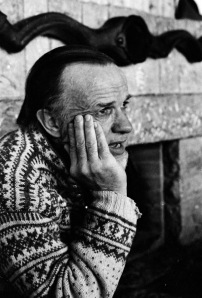 My first encounter with Francis Schaeffer came in 1977 when my church screened his film series, How Should We Then Live? As a junior high school student, I was mesmerized by this funny-looking man who sported a goatee, wore knickers, and spoke on location at sites all around the world about the decline of Western culture. The details of his argumentation were over my head, but his celluloid ruminations left an indelible impression. Schaeffer convinced me that Christianity cares about matters of truth, beauty, history, and culture.
My first encounter with Francis Schaeffer came in 1977 when my church screened his film series, How Should We Then Live? As a junior high school student, I was mesmerized by this funny-looking man who sported a goatee, wore knickers, and spoke on location at sites all around the world about the decline of Western culture. The details of his argumentation were over my head, but his celluloid ruminations left an indelible impression. Schaeffer convinced me that Christianity cares about matters of truth, beauty, history, and culture.
Francis Schaeffer had an abiding interest in truth. As a young man, he enrolled at Westminster Theological Seminary in order to study under J. Gresham Machen, a leading advocate of orthodoxy in the battle with theological liberalism. He became caught up in a fundamentalist movement that rallied around the absolute truth of Scripture. After several pastorates in the United States, Francis and his wife (Edith) and children moved to Switzerland in 1948 with the dual goals of promoting evangelistic work among children and building up Bible-believing churches in post-war Europe. The focus of the Schaeffers’ ministry eventually shifted to reaching out to disaffected young people with an intellectually-credible presentation of Christian truth.
In the 1950’s and 1960’s, many college-age students were asking hard questions about the Christian faith. Some were influenced by existentialist philosophy, while others had their faith challenged by theological liberalism. There was widespread questioning of the middle class values that seemed to have taken hold in the churches. Schaeffer was greatly concerned that too many churches were simply telling young people to believe without taking their questions seriously. He thought honest questions deserved honest answers, and he was convinced the Bible had the best answers for those questions. L’Abri Fellowship was birthed as a place where students could come to ask hard questions and receive answers in the context of a caring Christian community.
Much of the ministry of L’Abri took the form of one-on-one and group discussions. Many testify that Schaeffer exemplified great personal focus and compassion in these encounters. In his chalet on a Swiss mountainside, he modeled loving listening as a prelude to speaking truth. Schaeffer came to look back with regret on the lack of love often on display in the fundamentalist battles of his earlier days, and he sought to promote a winsome unity of truth and love in Christian living and proclamation.
Eventually, word about this intellectually-minded evangelist got out, and Schaeffer had the opportunity to reach a broader audience through writing books. Twenty-three of these appeared from 1968 until his death in 1984. My encounter with Schaeffer that began with that film series continued as I voraciously read many of his books. I found in their pages a vision of Christianity that affirmed life and culture and answered basic philosophic questions with the truths of Scripture. It is a vision I embraced and, with faltering steps all along the way, have sought to live out.
Francis Schaeffer was not a professional scholar. Many academics have found fault with some of his philosophical and historical judgments. I think many of these criticisms are valid, and we should not look to Schaeffer as providing some sort of air-tight master system of truth. He was an evangelist who took the life of the mind seriously, and we can be grateful that quite a few scholars influenced by him in their youth are standing on his shoulders and providing more rigorous Christian investigation into many topics he explored. By way of analogy, I believe Schaeffer did get the identification of a few trees wrong, but that didn’t keep him from giving a basically sound picture of the forest. His vision of the Bible speaking to all of life continues to be inspiring.
Some at Bethel are getting their first taste of Francis Schaeffer as we study his book, Joshua and the Flow of Biblical History, in adult Sunday School. For those who would like to read more of his work, I will make some recommendations. To get a sense of the heart of the man, I suggest reading his short book entitled, The Mark of the Christian. In its pages, he pleads for Christians to wed an uncompromising stand for truth with a visible demonstration of love. His basic philosophical and cultural apologetic is presented in a series of three books – The God Who Is There, Escape from Reason, and He is There and He Is Not Silent. These three have been collected under one cover with the title, The Francis Schaeffer Trilogy. Schaeffer’s intellectual concerns were never separated from a life of Christ-centered devotion, the latter of which finds expression in his book, True Spirituality. It should not be neglected. Finally, for those interested in the story of the Schaeffers’ ministry, I heartily commend Edith Schaeffer’s account in L’Abri. You will find it to be a thrilling story of the Lord’s guidance and provision as He led the Schaeffers in unexpected directions with unanticipated results.
I never had the pleasure of meeting Francis Schaeffer. He died on the day I turned twenty. But few people I have met have had as much influence on my life and thinking as this man who raised his voice in the cause of truth and love in an age of doubt and despair.
